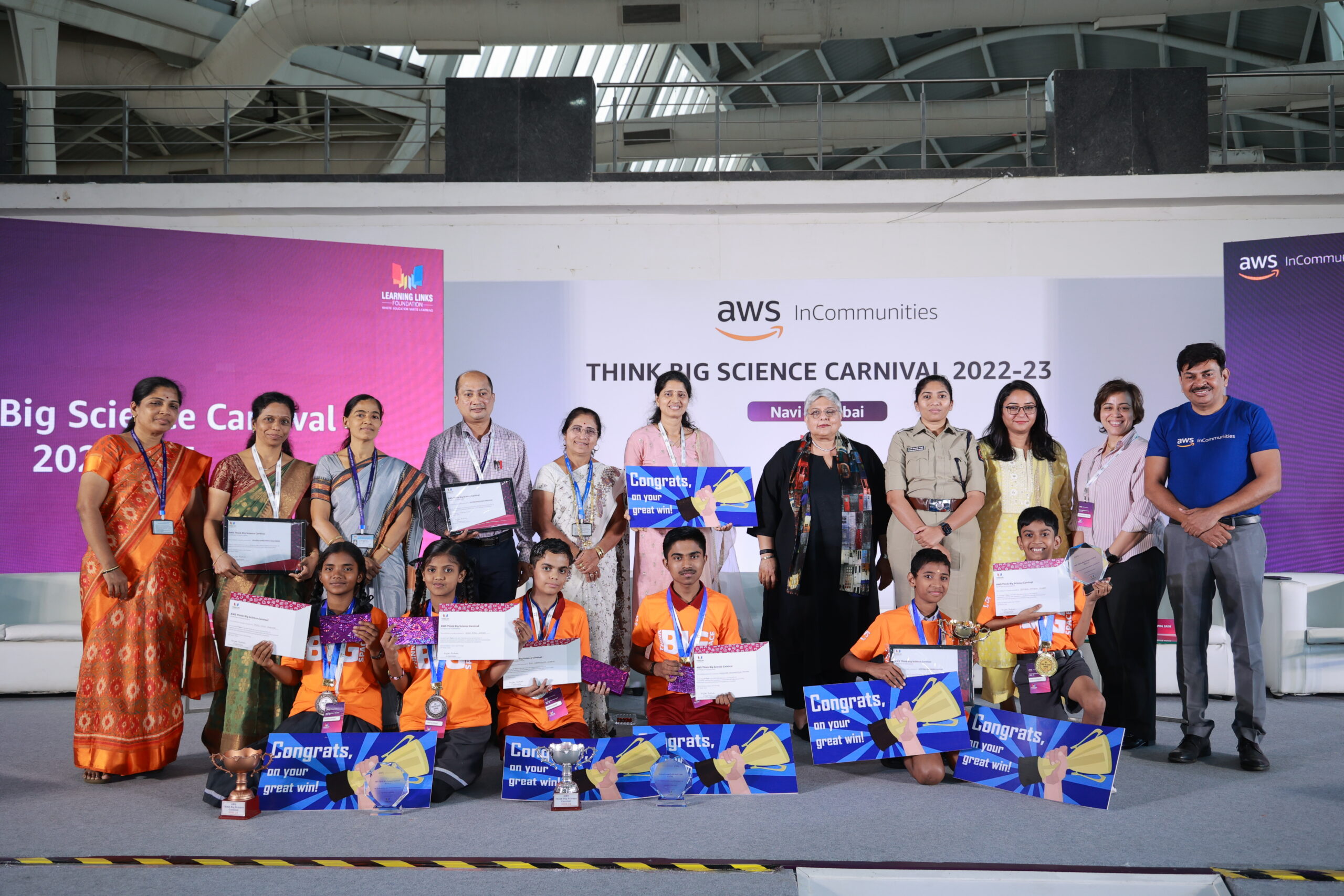Picture an electric car with built-in self-charging capabilities to ensure the vehicle is self-sustaining, or a gadget that can send reminders on when leftovers in the refrigerator need to be consumed based on the colour, texture, and smell of the food. These examples are innovative ideas from young students aged 11 to 14, and are a few of the many interesting science projects developed by over 60 students from Navi Mumbai’s municipal schools for the finale of the AWS Think Big Science Carnival, 2022-23, held on March 24, 2023.
In its fourth year now, the science carnival is organised by AWS InCommunities as part of the AWS Think Big Spaces program, a comprehensive change initiative that focuses on providing students from underserved communities, the infrastructure and guidance required to excel at STEAM (Science, Technology, Engineering, Arts, and Math) subjects early in life, leading the way to STEAM careers in the future. More than 2,000 students from 50 Navi Mumbai Municipal Corporation (NMMC) schools attended the finale conducted at the CIDCO Exhibition Centre in Navi Mumbai.
Speaking at the finale, Aruna Yadav, Education Officer, Navi Mumbai Municipal Corporation said, “It is wonderful to be here at the AWS Think Big Science Carnival which has been organised for the students of Navi Mumbai. Many of the children’s projects are unique and astonishing; their thinking is refreshingly different, and it is exciting to see this kind of talent. I have no doubt that these children can go on to become scientists and make India proud, and also develop solutions for the general public. I thank the AWS team for organizing this event and providing these children a platform that will take them a step closer to becoming scientists and innovators.”
The AWS Think Big Science Carnival provided a platform for students to look closely at problems that local communities face in the areas of agriculture and food safety, health and hygiene, environment conservation, renewal energy, and disaster management, in line with multiple Sustainable Development Goals laid down by the United Nations, and develop STEAM-based ideas. Over 270 students submitted their project ideas in the preliminary round of the science carnival, and were mentored by STEAM experts, including AWS employees. Students with the most innovative ideas in the preliminary stage were supported to build their prototypes, and the top 30 prototypes were presented in the finale event. Students subsequently use the prototypes and experience to compete in district, state, and national-level competitions.
Winners of the AWS Think Big Science Carnival, 2022-23
First place: Elesh Raju Mala and Ratnesh Jaybhim Gilake, students in Grade 7 at Navi Mumbai Municipal Corporation 18, devised a multi-purpose bag, especially keeping two-wheeler riders in mind. The first is an anti-theft feature, which can assist someone in a crowd by protecting their belongings. The bag has a solar channel that can be used to recharge batteries and charge gadgets like mobile phones in an emergency, and includes an integrated umbrella. The airbag is the most intriguing feature – the in-built sensor in the bag will activate an airbag in a matter of seconds, in the event of an impact. This is a highly beneficial feature for riders as airbags are not part of the design of two-wheeler vehicles currently.
Second place: Ram Sharma and Shivkumar Paswan of Grade 8 from Navi Mumbai Municipal Corporation 72 presented a smart multi-toilet cleaning machine that is an all-in-one electric tool which can sweep, mop, wipe, and dust a bathroom with ease. The students saw how the cleaners in their school were struggling to clean the bathrooms and decided to create an easy and innovative solution to make their lives easier.
Third place: Priti Vicky Kalkho and Jinat Raju Shaikh from Grade 7 of Navi Mumbai Municipal Corporation 15 got the idea of their project ‘Automatic stop gate for overflow’ from a six-year-old incident when the Savitri River in Maharashtra overflowed due to heavy rains, washed away cars, and caused a large number of fatalities. They aimed to help curb such occurrences in future. They devised a system, which will help detect when it starts to rain heavily and close the river’s gate automatically when the force of water increases. The gates open as soon as the water levels recede.


























